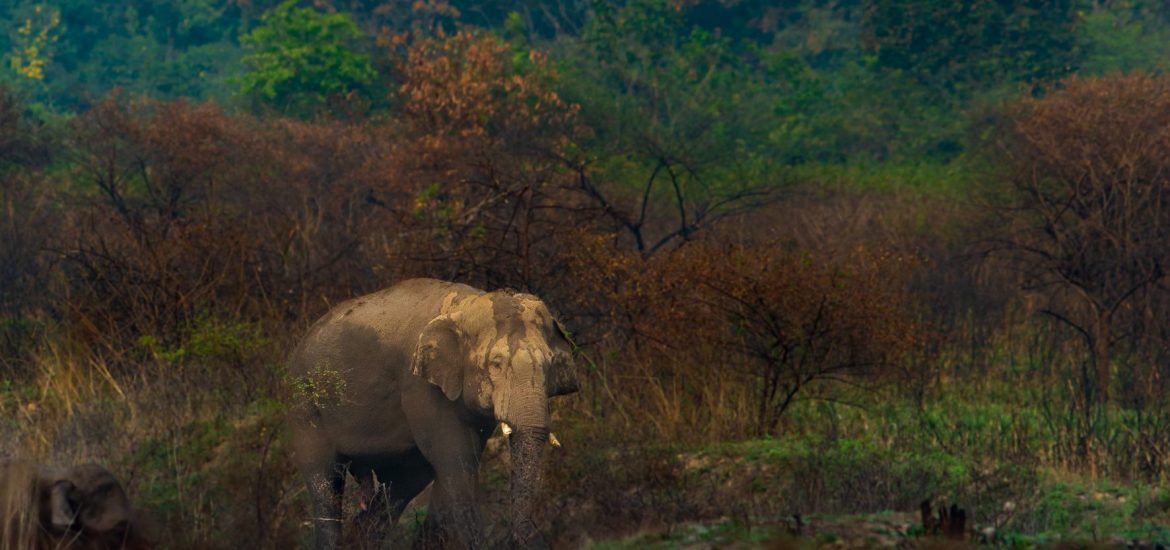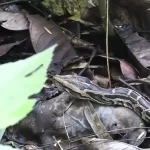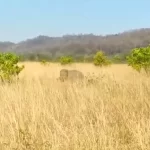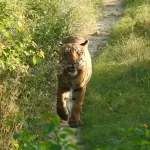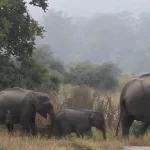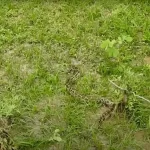When he first arrived in this opening of the forest, as a young calf following her mother who was the matriarch of the herd, the smell of unripe wheat was too tempting. Though the sight of the twinkling lights of the distant fire was threatening, the faith he had in the members of the herd and the sweet prospect of munching on the green shoots of the juicy crop was too strong. The herd was quietly grazing for some time when he heard a loud sound of a human voice, something that he had always been afraid off. Every time he had heard this sound, it was followed by a violent commotion of these strange creatures walking on two legs. In the past, the herd had been chased from this forest clearing by humans carrying the threatening lights, fire and deafening sound of fire crackers and once a young bull was injured by bullets fired randomly at them. On this occasion, he remembers being chased by a crowd of people, shouting and throwing fire crackers at the herd. While this happened every time he visited this forest opening year after year, he grew up and parted company with the herd. He wandered off in all directions, in search of food, water and to look for mating opportunities during the elephant mating season. However, he would always come back to this forest clearing to munch on the crops grown by humans.
A few decades later, during one monsoon season when he found himself in the same location, he found that very few fields were planted and he had to come very close to human dwellings to feed on the wheat crop. On one fateful night he quietly walked up to a human dwellings to feed, a door suddenly opened and a man, not realizing that he was standing there, walked almost up to him. When the man realized that there was an elephant standing at an arm’s length, he turned back screaming and ran into the partly open door, fell down and injured himself. Surprized by the proximity of the scary human, he panicked, gave a loud trumpet and bolted back to the safety of the jungle.
He did not visit this part of the jungle for a few years after this scary incident. Surprisingly, when he found himself at this location, a few years later, there was no sign of the sweet crops or humans. To his surprise, many of the human dwellings had been demolished. A variety of wild grasses were growing where once there were field. The area was full of Spotted Deer, Wild Boar, Golden Jackal, Indian Peafowl, Grey Francolin and Paddyfield Pipit. There were lot of ground birds including Yellow-throated Lapwing and Indian Thick-knee that had taken up their breeding territories where once the oxen used to plough the fields. There always used to be an odd tiger in the jungles surrounding the forest clearing. Now he could smell the presence of several tigers in the area.
The village of Laldhang that had been a settlement of approximately 200 people, had been moved out of the forest to a location close to civilization. These people had no access to electricity and water and for all their household needs, they had to travel through the jungle to nearby town of Ramnagar at a distance of 20 km. Children had to walk through the forest to the nearby Dhela village to attend school. Once the village was relocated and the field were taken back into the wild, systematic plantation of local grasses was undertaken and agricultural weeds were periodically removed. Within a few years, the habitat improved, inviting a large number of wild animals to inhabit the freshly created grasslands. The revitalized prey base ensured that the tiger numbers increased in the area. They were now freely moving between freshly created Dhela zone and adjoining Jhirna zone of Corbett Tiger Reserve.
The grand old elephant now regularly visits the Laldhang grasslands and though an elephant never forgets anything, the memory of being chased by screaming mobs from this forest opening has become a thing of the past. Now tourists come, riding jeeps and taking photographs of him and other creatures in his neighbourhood. The jungle is now more peaceful and bountiful.
An Elephant remembers!
